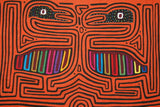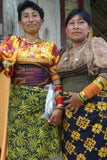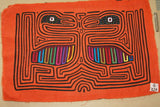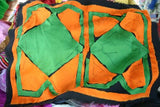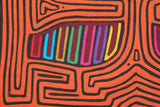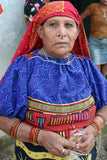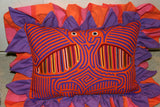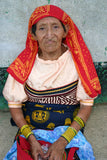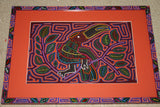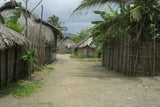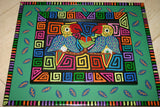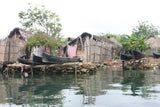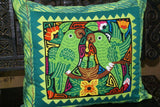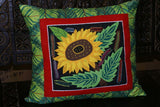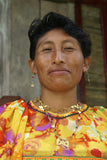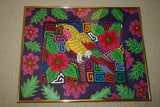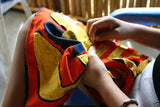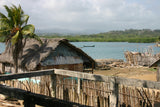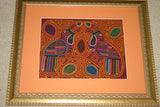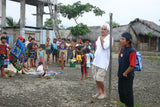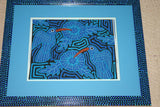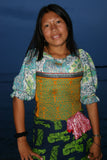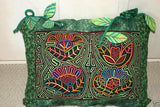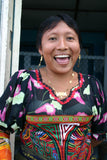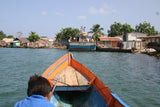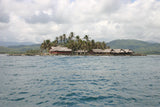Kuna Indian Abstract Mola blouse panel, Folk Art, from San Blas Islands Panama. Hand stitched Panel Applique: Egret Bird Traditional Optical Illusion 17" x 11.25" (82B)
Vintage one of a kind San Blas Traditional Colorful Blouse Mola Applique, textile Art By American Indian Kuna seamstress, Perfect Parallel Lines. Traditional Optical Illusion and Egret Bird Motif. From the 70's, hard to find today.
Size (HUGE): 17" x 11.25"
Item number 82B
Shown on the 1st, 3rd and 5th photos
Category: Birds
collected in Ustupu Island, San Blas, Panama.
Would make an intense pillow as some of the photos below show.
The most traditional, the oldest, the purest and truest of molas ever created were originally the geometrics ones, abstract masterpieces of handstitched vivid panels and a must for any serious collection. Harder and harder to locate today because the style is disappearing altogether, they are being replaced by less abstract motifs such as scenes of everyday life, animals, plants etc….
This particular type of geometric mola, with an image representing something that would not normally be abstract within an abstract background, that it blends in as a complete mosaic, is one of the oldest patterns that were once made in the 50's and evolved later, from this kind of design into full blown more exact representations of the subjects themselves, but often still with geometrics backgrounds.
To this day, we have prized ourselves in collecting the best authentic traditional “not-made-for-tourists” blouse mola panels. We removed them from the blouses ourselves, purchasing them one by one while sailing from one island to the other, direct from the local artists: we only select the most outstanding, detailed artwork, showing the best color combinations, rendition, originality, authenticity and created with hand sewn stitches, most of the time so small they are almost invisible.
Kuna folks create motifs on panels, in reverse applique and applique, with fabrics of different colors, panels that they will later wear with a great deal of pride as imagination, technique and color combining abilities affects each creation, which is often also enhanced by microscopic and perfectly rendered embroideries, the finished product earning respect and status for the maker.
Creating a detailed mola, on average, takes 1 month but it can take longer according to the size, intensity of the motifs, the difficulty of the pattern, the detail involved, and the minuteness of the stitches.
Molas are wonderful traditional prized folk art, hand stitched fabric panels that the Kuna women, from Indian tribes living in the remote San Blas islands off the coast of Panama, wear on the front and back of their blouses. They are masterpieces of time consuming intricate textile art, each created by an artistic accomplished seamstress with imagination, technique, originality and talent and each is unique: they are delicately and minutely hand sewn recreating either an abstract geometric motif reminiscent of body tattoos from their past, or of the brain coral that surrounds the islands, or inspired by kuna history, religion, shamanism or daily life, and by what surrounds the makers such as nature, birds, animals, sea etc… They are highly collectible in the world or textiles and visual arts. We sell them to museums and collectors all over the world.
One cannot but admire the intense detail of the motifs and the richness of colors and embroideries of this unique disappearing art.
Some very demanding molas, workwise, made by the best of experts, show perfectly rendered backgrounds such as these:
1) Labyrinth background inspired by brain coral.
2) Tiny triangles lined with different color fabrics.
3) Crosses such as multiplication signs.
4) Saw teeth lines
All our unusual handcrafted or rare items come with pages of research and information concerning them, with history of the tribes and photos as well, depending on item and whenever possible. In the case of the molas, we will send you 5 lengthy documents with photos referring to everything you need to know about them, from their history to their spiritual meanings or messages, the traditions still embraced thru them, and the difficult task of creating them.
Molas are getting harder and harder to find in the field and as a result have tripled or x 4 in price on location: in many San Blas islands' villages, we did not find a single person wearing one or having one for sale. It saddened us a great deal to see such wonderful art not being passed on to the next generation since the knowledge and beauty of creating these artistic fabric panels will be lost as a result. The next generation, as everywhere else, is not interested in creating 2 blouse panels that can take, each, 1 month or more to complete. They are looking forward to a more modern future, while wearing western clothing, especially since many islands now have electricity which leads to computers, cell phones and TV’s and to the extinction of the need to craft.
This last trip there, I noticed, with regret, such a tremendous decrease in the production and wear of such a wonderful and colorful traditional attire, soon to be a distant memory I am afraid.
Additional pictures placed here also show a variety of photos from our trips such as my husband distributing goods to the Indian community, village scenes, a mola being started, a Kuna woman wearing one, and also how they can be used in your home to create a great cheerful and colorful one of a kind accent.
If you want to see some of our framed molas, framed in unique signed hand painted frames matching each mola, or the fun delightful pillows we create with them, each one of a kind as well, contact us so that we can send you pictures which will give you wonderful ideas on how to display and use them in your home.
When shipping internationally, we group ship multiple purchases to save you money, and find the best rates available. If you have any questions or want to see research conducted on this piece and photos of tribes, let us know.


























